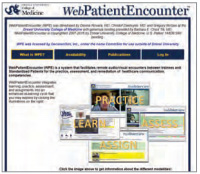WebRolePlay Proposal Wins "Reimagine Education" Awards
March 7, 2016
The College of Medicine's proposed WebRolePlay learning tool received two of the highest awards at the international "Reimagine Education" conference held in Philadelphia in December 2015.
The global competition was created in 2014 by QS Quacquarelli Symonds in partnership with The Wharton School SEI Center of the University of Pennsylvania to identify the most innovative approaches in higher education to enhance learning and student employability. The 2015 competition received submissions from 520 universities and enterprises from 50 countries, with 22 awards judged by a panel of 40 international experts — a "who's who" of higher education.

WebRolePlay would expand on the College's WebPatientEncounter technology to allow students to practice and assess interpersonal skills with each other.
The College of Medicine won first place in the Life Sciences category and second place in the e-Learning category for the proposed WebRolePlay, a peer-based online framework for the structured learning, practice, and assessment of interpersonal skills, developed by Christof J. Daetwyler, MD, associate professor of Family Community & Preventive Medicine and developer of online resources for medical education.
"We propose to build WebRolePlay as a further expansion of our existing WebPatientEncounter technology, which facilitates remote audio/visual encounters between learners and standardized patients," explains Daetwyler. (Standardized patients are actors who are trained to represent a medical case scenario and give structured feedback to the students they interact with.) "WebRolePlay will be a simple, cost-efficient tool for two to 12 students to engage in remote role plays to practice and assess interpersonal skills with each other."
WebRolePlay has the potential to transform interpersonal skills learning, says Daetwyler. "It takes the limiting factor — experts' availability — out of the equation while providing plenty of structured training needed for skills acquisition. It keeps learners in the learning cycle until they show proficiency, allows for students' self-organized peer learning, fosters interprofessional team building and training, and enhances understanding, empathy and conflict resolution." The application could potentially be used in any profession where such interpersonal skills matter.
Next steps: Developing the design for WebRolePlay (changing the one-way paradigm of WebPatientEncounter into multi-way traffic); writing and validating scripts; and conducting a multi-center pilot study.
This news article appeared in the winter/spring 2016 issue of Pulse.
Back to Top